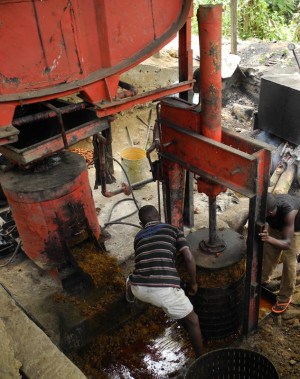
Over 200 families have benefited from the semi-industrial palm oil mills installed by the Environment and Rural Development Foundation (ERuDeF) as an alternative source of livelihood to support conservation in the forest areas of the Lebialem Highlands. The oil mills have helped the local people to save significant amount of time and energy that characterised the traditional palm oil producing method. This was uncovered by a recent survey conducted by ERuDeF’s Livelihood and Economic Development Program. The survey equally indicated that palm oil production has increased on average by 50% as processing using machines increases output. Family incomes have consequently increased on average by about 50% as well following rise in output. This increase in income has had significant and direct implications on standards of living, ability to pay school fees, hospital bills, and other utilities for the wellbeing of the household as one farmer explained. “With the installation of a palm oil mill in Besali, I realised that the quantity and quality of oil I produce has improved and this has equally raised my income. I have been able to send my children to school with less difficulty” Ms. Francisca Nkem said. The oil mills have also helped to reduce stress from female family members who hitherto transported palm fruits by head load and lost much energy through smashing nuts for the collection of crude palm oil.
On the environmental front, the level of awareness of the communities has increased by at least 20% following conservation education as rationale for the installation of the palm oil mills. Following the signing of a community conservation agreement dating back to 2011, a significant portion of inhabitants of villages adjacent the proposed Tofala Hill Wildlife Sanctuary have shunned hunting practices and are now sharing information on nature protection freely to others, moving away from unfriendly environmental practices such as bush burning, avoiding application of chemical fertilizers and introducing agro-forestry species to their agricultural practices, etc. This change of attitude is further confirmed by the reducing number of human signs recorded in the core conservation habitats of the critically endangered wildlife. Thus, palm oil mills while providing enough incentive for villagers to stay off the core wildlife habitats, have also contributed to the socio economic development of the enclave communities.
Just to note that following the discovery of a sub population of the critically endangered cross river gorilla in the then Bechati-Besali-Fossimondi forest, and now proposed TOFALA Hill Wildlife Sanctuary, ERuDeF launched a series of joint conservation and sustainable community development efforts in the landscape that included the installation of palm oil mills to benefit local communities. Two years on, ERuDeF has donated 5 palm oil mills and the impact of the mills has been accessed on both the wellbeing of the local population and on the conservation of the cross river gorilla and other primates in the landscape
By Forbe Hodu



